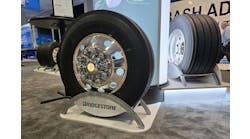In June, the Supreme Court overturned the "Chevron deference," a major legal doctrine that empowered federal agencies’ ability to interpret the law when that law is ambigious.
The precedent stemmed from Chevron U.S.A., Inc. v. Natural Resources Defense Council, Inc., a 1984 case that challenged the Environmental Protection Agency's authority to define sources of air pollution. The Supreme Court unanimously ruled federal agencys did have such a right, and the EPA has since used the ruling as a way to enforce emissions regulations.
This raises the question of whether various agency policies, such as emissions regulations, will still be supported by the judicial system. But is this a big deal for the trucking industry?
“Some have argued it’s not a big deal because courts have been working to interpret statutes to find there is no ambiguity in the first instance (in which case, Chevron did not apply),” Prasad Sharma, partner at Scopelitis and general counsel for the Truckload Carriers Association, told FleetOwner, a Fleet Maintenance affiliate. “They point to the fact that the Supreme Court has not relied on Chevron to decide a case of late.
“However, it’s a longstanding precedent that was largely followed by the lower courts, so it is a big deal. It will shift power from agencies to the judiciary and heighten the importance of Congress legislating with clarity to address issues that arise in the modern world.”
The end of Chevron deference represents a significant shift in interpretive power. With it comes a new possibility for courts to block major agency rulemakings from the EPA, FMCSA, and others.
How the Chevron deference was overturned
In June, the Supreme Court overruled the 1984 Chevron ruling in the case Loper Bright Enterprises v. Raimondo.
“The Supreme Court overturned the Chevron precedent, indicating it was inconsistent with the separation of powers under the Constitution, which assigns interpretation of the law to the judiciary,” Sharma said.
The decision shifts the power dynamic between the judiciary and federal agencies. Courts are no longer required to follow an agency’s reasonable interpretation of a relevant law.
“Going forward, courts are to do the work of interpreting statutes enacted by Congress using the tools available to courts,” Sharma said. “Courts may still consider the views of an agency and give it weight based on how long the agency has consistently held the view, the thoroughness of the agency’s consideration, and the validity of its reasoning. However, the courts no longer have to defer to the agency’s interpretation.”
This reduces agencies’ influence in defending against legal challenges.
“To the extent that an agency is filling gaps left unaddressed in a statute or interpreting an ambiguity, the agency will not enjoy deference but will, like other litigants, have to use its power to persuade,” Sharma said. “Because Congress is often unable to legislate with clarity on the wide range of potential questions that arise when Congress addresses an issue, agencies will have less latitude to carry out their views/preferences. On the other hand, some would argue that agencies were, under Chevron, exercising authority they never really should have had.”
What it all means for trucking
Judges received a newfound freedom to strike down major agency rulemakings. For trucking, relevant agency rules now have a new vulnerability in the court system.
“The reversal of Chevron is relevant to all agency rulemaking subject to the APA,” Sharma said. “For commercial transportation, that means substantive rules out of FMCSA, NHTSA, EPA, FHWA, among other agencies.”
This could include EPA emissions regulations, carriers’ Compliance, Safety, and Accountability scores, and more.
“It could be any number of statutes that have left gaps or ambiguities (arguably, nearly every statute),” Sharma said. “One area getting interest is the transition to zero-emission vehicles in California under the Clean Air Act and EPA’s construction of its waiver authority.”
EPA-granted waivers allow the California Air Resources Board to set its own emissions regulations. The Clean Air Act permits the EPA to grant California waivers to set its own emissions standards. This helped CARB develop zero-emissions vehicle mandates under its Advanced Clean Trucks regulation.
Legal challenges currently surround EPA's authority to grant the waiver for ACT, in part because the agency cannot set its own EV mandate, as Julia Stein writes in Legal Planet. According to Stein, a world without Chevron deference means that reviewing courts have greater power to ignore EPA’s own interpretation of its waiver-granting authority—an existential threat to the California ZEV mandate.
“Moreover, in combination with the Court’s revival of the major questions doctrine, rulemaking with impacts on broad swaths of the economy will be under heightened scrutiny,” Sharma told FleetOwner.
The major questions doctrine became most relevant after the Supreme Court’s 2022 decision in West Virginia v. Environmental Protection Agency. According to this doctrine, courts should hesitate to assume agencies have the independent authority to make actions of economic or political significance without explicit Congressional approval.
The major questions doctrine and judges' newly expanded authority to interpret law illustrate a shift in power away from federal agencies. Agency rulemaking has new vulnerabilities in the judicial system. Agencies hoping to make grand changes to the trucking industry could face new, critical setbacks in court.
This article was originally published on FleetOwner.com.



